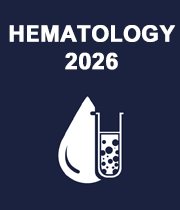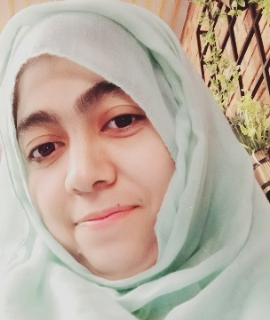Title : Reciprocal expression of miR-22-3p and BCL11a as circulatory markers for beta thalassemia
Abstract:
Thalassemia is a hereditary disease due to defective globin chain production. This defective globin become the cause of accumulation of excessive globin (unbound) in the erythrocytes and ultimately lead to the ineffective erythropoiesis. Despite the modern technologies, there is no ultimate treatment of thalassemia disease, only management (blood transfusion) is possible. The average life span of thalassemia patient is short (30 years). Circulating microRNAs have been emerged as promising disease biomarkers for diagnostic and therapeutic purpose in many diseases. These are the small non-coding RNA molecules that regulate the expression of genes involved in erythropoiesis and thalassemia. Pakistan is amongst the countries with highest thalassemic burden throughout the world, about 100,000 transfusion dependent thalassemia patients have been reported. According to our best knowledge, there are fewer studies focusing the association of microRNA with beta thalassemia in Pakistan. The aim of this study is to evaluate the expression of miR-22-3p and its target gene BCL11a as circulatory markers for early prediction of thalassemia. The expression level of miR-22-3p and BCL11a was assessed in the plasma of beta thalassemia patients (n=42) and compared with controls (n=25). The relative expression of circulating miR-22-3p and BCL11a was checked by quantitative real time PCR. The expression level of circulating miR-22-3p was up-regulated significantly in the thalassemia patients as compared to healthy control individuals. However, BCL11a levels were significantly downregulated in patients as compared to controls (P<0.05). These results suggested that reciprocal expression of miR-22-3p and BCL11a may be used in combination as circulatory marker panel for beta thalassemia. In this study it was also observed that the expression levels of miR-22-3p and BCL11a were not affected by age and gender difference. Th upregulation of miR-22-3p suggested that it may be used as a therapeutic target for treatment of beta thalassemia in future.
Audience Takeaway:
- The audience will benefit from the research and may check and validate the same in their own population, as there are population differences based on genes.
As micro RNAs are emerging as circulating biomarkers, so this study may open a new horizon for researchers, scientists and medical professionals to use such diagnostic tools for thalassemia. - It will be helpful for researchers, clinicians, hematologists to implement novel methods for diagnosis and treatment.
- Yes the research can be used by other faculty members to expand their research and teaching. Future research may be done to find microRNA based therapeutic target for the treatment of thalassemia.
- Yes it provides practical solution to thalassemia diagnosis and treatment that is a big problem worldwide.
- It will definitely improve the accuracy of a design and provide new information to assist researchers to design a new problem.
Key words: Beta-thalassemia, hsa-miR-22-3p, BCL11A, γ-globin, circulating, genetic markers



